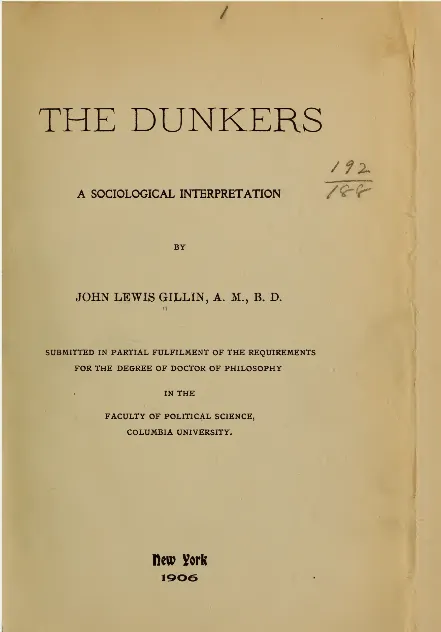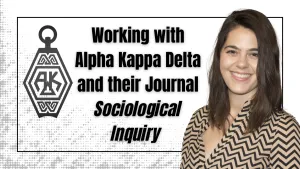I was doing some research with the Library of Congress Digital Archives when I came across something that caught my attention. As I was scanning through the digital artifacts I noticed photographs of an old book with the title, “The Dunkers; a sociological interpretation.” As it turns out the book was a dissertation from 1906 written by John Lewis Gillin. I was unfamiliar with Gillin, but he was a notable sociologist, even serving as the president of the American Sociological Association in 1916.
So, I began reading about the Dunkers and I was captivated for a couple of reasons. First the story of the Dunkers is interesting and second their story is similar to all of the groups that make up the Pennsylvania Dutch in America.
Who are the Dunkers?
The Dunkers have an interesting social history and Gillin tells this story in depth in his first chapter. He begins his story around the history of the Rhine River. Part of his argument in the book is that the Dunkers became who they were as a result of material conditions. Beginning his history by describing the human interactions with the river region over time is just one way that this entire book continues to relate back to this point.
Gillin gives a very in-depth historical outlook of the economic, social, religious and political context of Europe at the time. In short, the Dunkers were protestant peasant farmers living in the area where on one side French royalty was oppressing people and on the other side, the Roman Catholic Church was oppressing people. Over time the Rhine River Valley gained more and more immigrants seeking refuge. Gillin does a really remarkable job describing the constant social change occurring in the region that led to the foundation of the Dunkers.
The Dunkers were a Baptist denomination that rivaled the Lutherans and Reformation Church. They get their name due to the fact that they introduced dunking as their means of baptism as opposed to the Lutheran practice of sprinkling water on infants (Dunkers were adamantly opposed to infant baptism). While Gillin points out the differences in practices between the denominations at the time, he does not beleaguer these points and in terms of the German migration to America, many of these groups had similar experiences, Gillin just uses the Dunkers as his case and point of reference for his story.
Are Dunkers Pennsylvania Dutch?
The concept of Pennsylvania Dutch is relatively new to me but I have a personal interest, so I like learning about the history. As I got into Gillin’s book, it got me wondering if the Dunkers are the origin story of people we now refer to as Pennsylvania Dutch. The short is that the Dunkers are one group of many that make up all the people referred to as Pennsylvania Dutch. It is kind of a catch-all term to describe settlers that fled religious persecution in Germany. Pennsylvania Dutch can also refer to Amish, Quakers, Lutherans and others including the Dunkers.
All these groups had some things in common because they had similar histories, even if they disagreed with some principals and practices. Most of these people were poor and had been persecuted and subjugated in their European lives. Therefore, there was most likely a distrust of authority among these groups. Each of these groups were at the early stages of their organization, so they were all still kind of figuring out what they believed.
Also, many of these people had similar experiences getting to America and they settled in similar locations throughout America. Gillin makes this point about how the settlements started in places that were located along rivers and established routes. But the point is that even though Gillin is writing about the Dunkers specifically, we can imagine all of the people now known as Pennsylvania Dutch have a uniting factor in their historical origins in America.
Final Thoughts on ‘The Dunkers; a sociological interpretation’
This book really is worth the time. It is surprisingly easy to read considering it was published in 1906. Gillin explores the historical context of German migration to America in the 17th and early 18th centuries through the eyes of the Dunkers. He really nails the sociology by talking about the economic, political, social, and religious context of Europe at the time and how these factors led to the foundations of the Dunkers.
When I earned my MA in sociology, my “specialization” for my thesis was the Sociology of Religion. One of the main points I learned in my coursework was that what makes a religion “sociological” has a lot to do with the religion’s origin story. What was going on in society that led to the establishment of an organized religion? Gillin’s book really exemplifies this point by giving us a well-rounded historical context of the Dunkers and always coming back to his point that their foundation was a result of material conditions.







